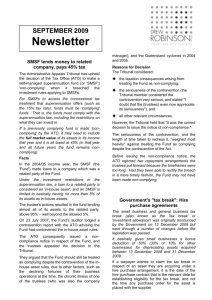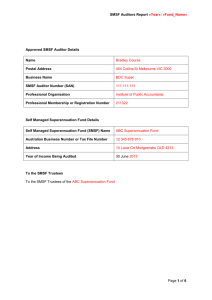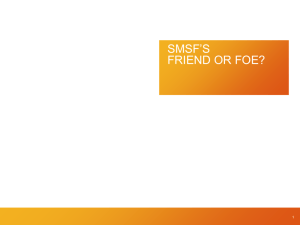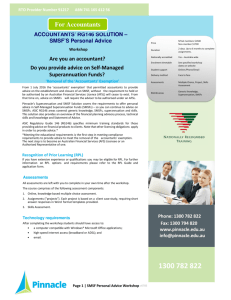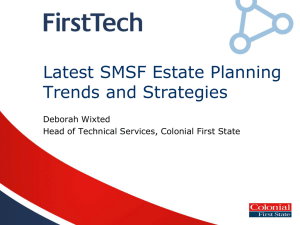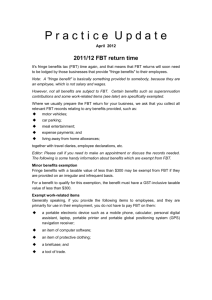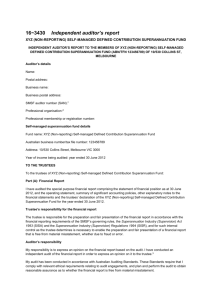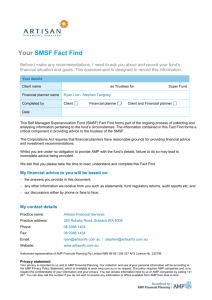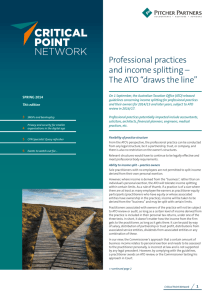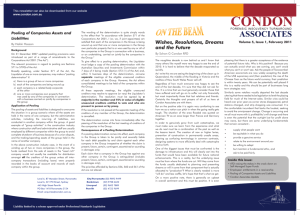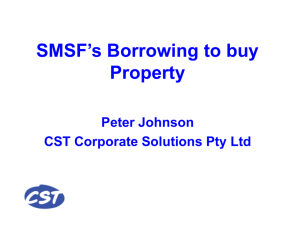SMSF Penalties & Compliance: June 2014 Newsletter
advertisement
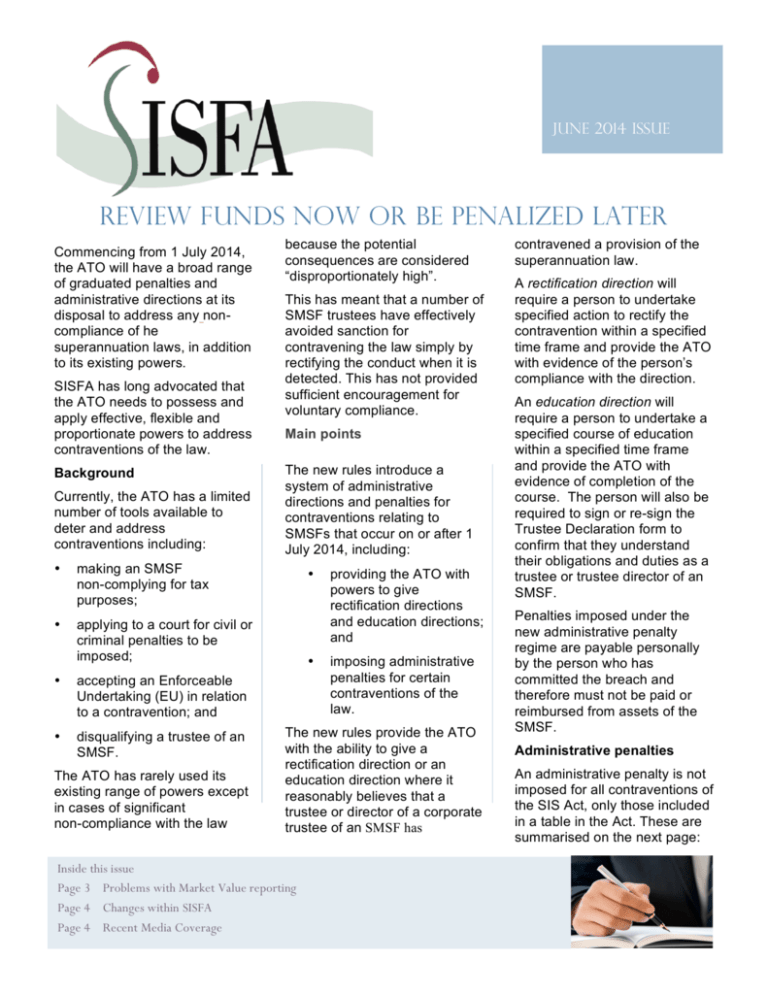
1 2 3 June 2014 issue Review funds now or be penalized later Commencing from 1 July 2014, the ATO will have a broad range of graduated penalties and administrative directions at its disposal to address any noncompliance of he superannuation laws, in addition to its existing powers. SISFA has long advocated that the ATO needs to possess and apply effective, flexible and proportionate powers to address contraventions of the law. Background Currently, the ATO has a limited number of tools available to deter and address contraventions including: • making an SMSF non-complying for tax purposes; • applying to a court for civil or criminal penalties to be imposed; • accepting an Enforceable Undertaking (EU) in relation to a contravention; and • disqualifying a trustee of an SMSF. The ATO has rarely used its existing range of powers except in cases of significant non-compliance with the law because the potential consequences are considered “disproportionately high”. This has meant that a number of SMSF trustees have effectively avoided sanction for contravening the law simply by rectifying the conduct when it is detected. This has not provided sufficient encouragement for voluntary compliance. Main points The new rules introduce a system of administrative directions and penalties for contraventions relating to SMSFs that occur on or after 1 July 2014, including: • • providing the ATO with powers to give rectification directions and education directions; and imposing administrative penalties for certain contraventions of the law. The new rules provide the ATO with the ability to give a rectification direction or an education direction where it reasonably believes that a trustee or director of a corporate trustee of an SMSF has Inside this issue Page 3 Problems with Market Value reporting Page 4 Changes within SISFA Page 4 Recent Media Coverage contravened a provision of the superannuation law. A rectification direction will require a person to undertake specified action to rectify the contravention within a specified time frame and provide the ATO with evidence of the person’s compliance with the direction. An education direction will require a person to undertake a specified course of education within a specified time frame and provide the ATO with evidence of completion of the course. The person will also be required to sign or re-sign the Trustee Declaration form to confirm that they understand their obligations and duties as a trustee or trustee director of an SMSF. Penalties imposed under the new administrative penalty regime are payable personally by the person who has committed the breach and therefore must not be paid or reimbursed from assets of the SMSF. Administrative penalties An administrative penalty is not imposed for all contraventions of the SIS Act, only those included in a table in the Act. These are summarised on the next page: Lorem Sisfa news Ipsum Trustee structure is relevant If a trustee that is a body corporate becomes liable to an administrative penalty, then the directors of that body corporate are jointly and severally liable to pay the amount of the penalty. However, for individual trustees penalties will be imposed on each of them. Example - Individual trustees who contravene a provision (adapted from EM) Jill and Merryn are members and individual trustees of Yellow SMSF. Jill and Merryn fail to ensure that accounts and statements for Yellow SMSF are prepared for the 2014-15 year of income. As a result, each individual trustee has contravened section 35B. An administrative penalty of 10 penalty units is imposed on each individual trustee of Yellow SMSF in their personal capacity (at $170 per unit). Jill and Merryn are each liable to an administrative penalty of $1,700 each (totalling $3,400). JUNE 2014 ISSUE Administrative penalties Contraventions of superannuation laws Penalty Contributions standards, preservation standards, benefit payment standards, investment strategy $3,400 Preparation of annual financial statements, keeping of minutes, notification of changes to trustees, keeping records for 10 years, failure to comply with rectification directions or education directions $1,700 Borrowing restrictions (such as with limited recourse borrowings), in-house asset restrictions, prohibition of loans and financial assistance to members and relatives, notification of significant adverse events $10,200 Appointment of investment managers, providing information and statistical data to the ATO $850 These administrative penalties are only imposed in relation to SMSFs. Watch out for “carry-over” contraventions Some contraventions only occur in the year of income a particular transaction took place. However, certain transactions, if not rectified, may cause trustees to contravene the SIS Act or SIS Regulations over a number of income years. For example: • SMSF trustees are prohibited from borrowing money or maintaining an existing borrowing of money, except in limited circumstances. Therefore, trustees may contravene this provision in the year of income that the borrowing is undertaken and for each year of income the borrowing is maintained in breach of the rules. Hence, any existing Limited Recourse Borrowing Arrangements ought to be thoroughly examined by advisers and independently audited to ensure no carry over contraventions arise. • Similarly, where the market value of a fund’s in-house assets exceeds the five per cent threshold, the trustees are required to prepare a written plan before the end of the following income year and carry out steps to ensure that the Fund’s in-house asset ratio returns to five per cent or less. Contribution courtesy of Darren Kingdon, Principal of Kingdon Financial Group and Director Self-managed Independent Superannuation Funds Association Sisfa news JUNE 2014 ISSUE 3 Market value reporting The majority of SMSFs have been audited for the financial year ended 30 June 2013, the first year when regulation 8.02B of SISR required fund assets to be recorded at market value. The more problematic assets have been real property, unlisted company and closely held unit trust investments. A significant point of contention has been trustee reliance on ATO document Valuation guidelines for self-managed superannuation funds. Whilst this guidance is useful to determine ATO expectations it is the Australian Auditing Standards that the auditor must adhere to. ASA 500, Audit Evidence, mandates that “(t)he auditor shall design and perform audit procedures that are appropriate in the circumstances for the purpose of obtaining sufficient appropriate audit evidence”. Instances have been seen where market values determined in accordance with the methodology of the ATO guidelines has not been supported by sufficient appropriate audit evidence. Even where an independent valuation is provided for audit to support market value ASA 500 compels the auditor, to the extent necessary, having regard to the significance of that expert’s work for the auditor’s purposes: • Evaluate the competence, capabilities and objectivity of that expert; • Obtain an understanding of the work of that expert; and • Evaluate the appropriateness of that expert’s work as audit evidence for the relevant assertion Additionally, ASA 540, Auditing Accounting Estimates, Including Fair Value Accounting Estimates, and Related Disclosures, requires the auditor to obtain sufficient appropriate audit evidence that fair value measurements and disclosures are in accordance with the applicable reporting framework. The auditor needs to assess the rationale for selecting the valuation method and exercise professional judgement in determining whether the method selected is appropriate given the nature of the asset. We have seen a limited number of fund investments for which sufficient appropriate evidence of market value was not provided most commonly because the cost of obtaining the evidence was prohibitive for the trustee. In these cases the only option was to modify the auditor’s conclusion in the audit report. These matters will become more contentious if section 35B of SISA or regulation 8.02B of SISR is included as reportable in the 2014 Auditor Contravention Report when trustees will need to decide between the costs associated with valuations and the potential ramifications of a contravention report. Contribution courtesy of Daniel Prunty Audit Manager Veritas Corporation Sisfa news 5/6/2014 JUNE 2014 ISSUE SISFA rebuts SMSF systemic risk Changes at sisfa We are pleased to confirm the appointment of Mr Nick Brookes to the newly created position of NEWS / ADVISER NEWS SISFA rebuts SMSF systemic risk Managing Director of SISFA. As SISFA enters an exciting new phase in its development, the Board is delighted that Nick has agreed to steer SISFA along this course. More details to follow soon. ISFA chair Michael Lorimer 05 May 2014 By Darin Tyson-Chan The Self-managed Independent Superannuation Funds Association (SISFA) has refuted recent claims from certain quarters of the industry that there is systemic risk involved with the SMSF sector. “Systemic risk in our superannuation system would only reside at the big end of town. How systemic risk occurs is if you’ve got one massive entity that experiences any particular failure that in turn affects hundreds of thousands of individuals in one fell swoop,” SISFA chair Michael Lorimer told selfmanagedsuper. “Just because you have one SMSF that makes a poor investment decision, or is the subject of bad advice or the like, it doesn’t affect the other 509,000 SMSFs. After a long association with SISFA, John McIlroy has resigned as a director and Treasurer John was a founding member of SISFA and the Board thanks him for the enormous effort he has volunteered in assisting in the to growth of the association over all this time. We wish him all the best in the future. “So the chances of the SMSF sector failing as a sector is virtually zero. It’s not going to happen.” Lorimer said statements suggesting the sector had inherent systemic risk associated with it indicated a larger part of the financial services industry still did not understand how the SMSF arena was structured and how it operated. “The challenges the SMSF sector has had to face over my entire career have always been the same,” he said. “Most of it can be explained by coming from self-interested parties who don’t like the sector for all sorts of reasons and genuinely don’t understand it. And they’ve never understood it. “The SMSF sector is a collective of a whole bunch of individuals and until the big end of town properly understands that fact, they will never be able to properly participate or have an informed view on how the SMSF market works.” Apart from the misguided commentary, the product innovation offered by some of the Australian Prudential Regulation Authority-regulated funds to counter SMSF leakage was another illustration of the lack of knowledge about the sector, he said. “Some of the big funds have come out and said ‘we’re a bit concerned a few of our people with large balances are leaving and setting up SMSFs so, guess what, we’ll put in a DIY option in our fund so people can do their own share investing through our platform’,” he said. “That not what people want. They’re building these things and they genuinely don’t get it. “People don’t set up an SMSF just so they can do some share trading. It’s all about control and ownership and they know that even if they’ve got plenty of investment options through a particular platform, if ultimately it is still sitting under the auspices of a totally arm’s-length prudentially regulated trustee, they know it’s not really under their control. “That’s why people opt for an SMSF.” http://www.smsmagazine.com.au/articles/sisfa-rebuts-smsf-systemic-risk 1/1 JUNE 2014 ISSUE Sisfa board Michael Lorimer Chairman MGD Wealth Ltd Qld ml@mgdwealth.com.au Mr Robert Jeremiah – Chair Technical Committee Sladen Legal VIC rjeremiah@sladen.com.au Mr Robert Shelton, Treasurer DFK Everalls Canberra ACT Robert.Shelton@DFKeveralls.c om Mr Peter Rimmington Crowe Horwath, Qld Peter.Rimmington@Bri.crowe horwath.com.au Mr Robert Stark Self Managed Retirement Systems, WA rstark@afswl.com.au Mr Nick Brookes, Managing Director VICTORIA ndjbrookes@bigpond.com Mr Andrew Cullinan Chair Policy Development Committee andrew.cullinan@leebridgegroup.com.au Leebridge Group, Chartered Accountants Ms Carmel Riordan Carmel Riordan Lawyers Adelaide, SA criordan@adam.com.au Mr Darren Kingdon Managing Director Kingdon Financial Group Limited, Queensland darren@kingdonfinancialgroup.com .au Mr Craig Fishburn Superannuation Audit Services, craigfishburn@superannuationaud itors.com.au
